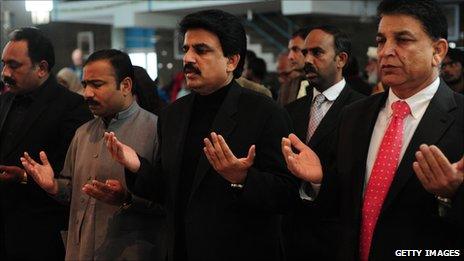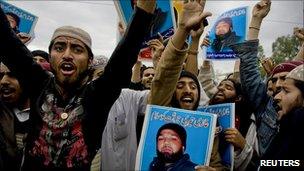What motives led to Shahbaz Bhatti's murder in Pakistan?
- Published

Shahbaz Bhatti vowed to fight on after the Punjab governor was killed, even though the prime minister abandoned the battle against the blasphemy laws
It is hard to find an immediate motive behind the murder of Pakistan's Minorities Affairs Minister Shahbaz Bhatti.
The courageous battle he had vowed to fight against the country's draconian blasphemy laws had already been abandoned by the government in the wake of Punjab governor Salman Taseer's murder.
In fact, the final surrender had come from no less a person than Pakistan's prime minister who had only last month pleaded with a large gathering of religious personalities to believe him when he said that his government had no intention of reviewing the blasphemy laws.
And unlike the slain governor - a veteran politician, a high profile socialite and one of the president's many billionaire friends - Mr Bhatti neither had the status nor the political clout to influence the state's agenda.
Some evidence of that also comes from the eerie silence on social media, from the extremists' side.
All that one sees are some anguished rants from some of Pakistan's best known liberals, many of whom are not even resident in the country.
Even hours after the assassination, we have seen none of the fierce onslaught against free speech that erupted on social media within minutes after Mr Taseer's murder.
Nor have we seen eulogies of his killers mushrooming on Facebook as they did after Mr Taseer's murder. It is a silence smug in the knowledge that their agenda is not at risk.
So why kill a man who considered himself - and was indeed considered by the world around him - to be so ineffective that he had not even bothered to seek proper security for himself, despite being constantly threatened by Pakistan's millions of faceless fanatics?
The answer perhaps lies in the difference between the commitment of the government and the extremists to their respective agendas.
Politics v ideology
The government had unambiguously decided to lay off the blasphemy laws after Mr Taseer's murder, its ministers hinting privately that it was a hornets' nest best left untouched.
The country's liberal political and social leadership had meekly followed suit and perhaps understandably so.
In their silence had rested a hope that by abandoning their agenda to rationalise any legislation-feeding extremism, they would perhaps be able to keep the extremists quiet.

Members of religious parties showed their support for the man who killed the Punjab Governor in January
It was never about any ideological commitment, just hard, cold politics that made tactical sense.
For the extremists though, it is all about ideology. It didn't matter if Mr Bhatti's battle had proved to be a non-starter or if he was an ineffective and powerless minister.
What mattered was that he had spoken against blasphemy laws in the past and was likely to do so again if a situation arose. That made him a legitimate target, not to be tolerated, not to be ignored.
Mr Taseer had said that he would continue to fight against blasphemy laws even if he was the last man standing. He could not stand for long.
And the ideology that led to his assassination has now sent another determined and deadly message to the state - that it will continue to fight till the last liberal falls.
This is how different the two commitments are. And for the liberals in Pakistan, this is how hopeless the situation seems to be.
- Published2 March 2011
- Published2 March 2011
- Published14 January 2011
- Published4 January 2011
- Published6 January 2011
- Published7 December 2010
- Published5 January 2011